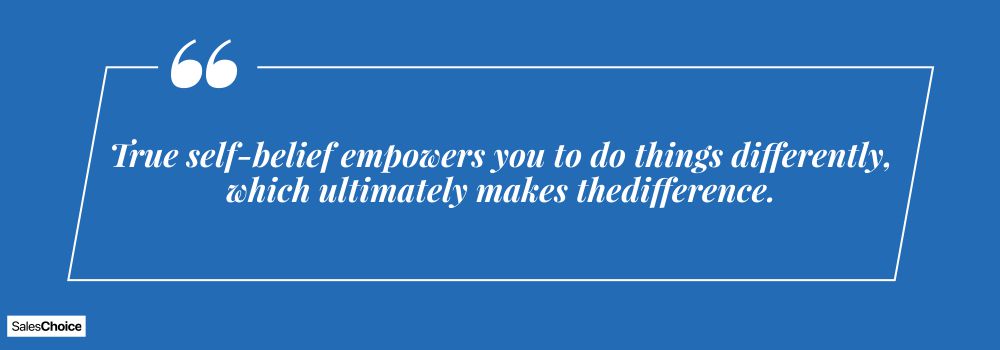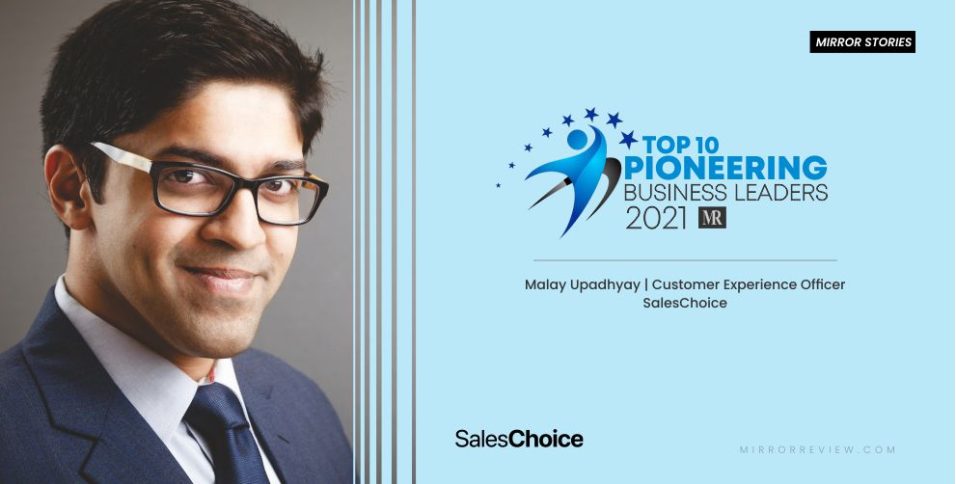In the past few years, the AI industry has gained remarkable traction. AI-enabled solutions are providing alternatives to unmet demands of the marketplace while creating new ones. SalesChoice is one such solution. It is an AI SaaS and professional services company that helps B2B sales organizations achieve revenue certainty.
Malay A. Upadhyay (Chief Customer Experience Officer at SalesChoice) is a multi-disciplinarian—with expertise in both AI and customer journey. The dynamic nature of his role involves him in the entire customer lifecycle, where he uses his marketing and sales focus to grow the company’s client base while ensuring the success of every project and customer relationship.
In a conversation with Mirror Review, Malay shared the secret to his success, thoughts on new-age leadership, and the effects of COVID-19 on the industry. Here are some highlights.
How is SalesChoice different from its competitors?
The company is unique in its one-stop offering for organizations looking to modernize their processes for AI enablement and achieve their unique revenue objectives. It brings an unparalleled depth in its strategic and custom solution capabilities in AI. In addition to the company’s data science services, its software caters to a wide range of B2B sales use cases directly on Salesforce. This includes improving the state of CRM data, accurate forecasting, sales coaching, performance tracking, personality matching, account management, and much more. As a result, sales teams can empower their sales cycles end-to-end from a single solution with minimal training.
What is unique about your leadership that separates you from the other new-age leaders?
I believe in situational leadership – an approach that aims to balance three pillars in any given situation: the organizational or customer requirements, the team’s wellbeing, and the unique circumstances of execution. These three demand adaptability in terms of skills or work preferences, determine priorities in the team’s approach to work and reflect the resources available to help set a realistically achievable target. At the end of the day, I think leadership styles are most productive when one’s natural inclinations are adapted to the organizational realities.
Share some of your lifetime achievements and the highlights of your journey.
I’m a Duke of Edinburgh awardee and was one of only 25 individuals chosen from around the globe to envision the industrial future for the Board of Marzotto Group in Italy. I also established a niche hospitality brand in India that eventually surpassed 250 other regional players in the industry ratings and saw a 30% YoY increase in revenues. With SalesChoice in Canada, we have won numerous awards and recognitions for its ‘Explainable AI’ approach, including the 2021 Corporate Excellence Awards for the Most Outstanding AI Sales Analytics Platform, & the 2019 Digital Transformation Award by IT World Canada. Dr. Cindy Gordon, SalesChoice CEO, and I recently published our latest book “The AI Dilemma” – a cross-industry review of the current and future state of AI.
In terms of my current journey operating in the AI world on both the technical and business sides, I have supported the European Commission’s AI policy as part of the European AI Alliance, trained executives on AI adoption, launched a course on AI Management, and also authored the Artificial Intelligence for Managers book with BPB Publications—one of the world’s largest publishers of IT books.
How has business leadership changed over the years? What has been the impact of COVID-19?
Leadership styles today are much more receptive to customers. And they approach it in two ways: they are more data-driven, and they are more sensitive to inclusion and fair treatment of stakeholders.
When it comes to the former, what’s been interesting for me is how the leadership focus has evolved over the last five years in tandem across industries. In 2016-17, the focus was on better BI enablement for reporting and visualization. Organizations then turned their attention towards data science, only to realize they needed to streamline the organizational data first. 2018-19 was about data clean up, governance and processes before conversations shifted to custom data science work. Leaders were beginning to warm up to some real groundwork around AI when the COVID-19 pandemic hit. It led companies to initially halt their AI investment, but then supercharged it as companies saw an opportunity to overhaul their systems and processes, which was otherwise hard to do.
In terms of our conduct, while good leaders always appreciate the personal priorities their colleagues often deal with, I think COVID-19 has helped everyone put that knowledge into action. There have been earnest attempts to help each other, not get lost at work at the cost of mental and familial wellbeing, and to applaud the team more often, particularly on the small victories.
What does the future hold? How will it help the industry and the customers?
SalesChoice is currently working on the augmentation of its app with a particular psychographic feature that may be a game-changer in performance analytics.
On the personal front, I recently launched an AI Job Risk Calculator, a fascinatingly simple tool to instantly estimate the odds of AI replacing your specific job within the decade.
Meanwhile, my third book in the AI Management series is currently in the editing phase with my publisher and will likely be out in Late Summer / Fall. And I’ll be picking up my Master’s dissertation from a decade ago to start work on my next book soon, which is on an exciting new blockchain-based economic concept to address inequality and climate change.
Share some advice for aspirational leaders who are looking to make a mark in the industry?
There can be many, but these 3 things have proven to be true for me. First and foremost, know yourself and be honest with yourself. Your probability of success will be maximized when you combine your true interests with expertise as they define your mission. The latter may be gained along the way, but the former is usually already there. Without these, your excitement, motivation, and performance will falter sooner or later.
Second, learn to unlearn from time to time. Best practices change, and things don’t work forever or in every situation. While it is good to take advice from industry experts, always do so contextually.
Third, don’t be afraid to strive towards a blue ocean to carve your own niche to be differentiated. Your mark in the industry is not defined only by the quality of your offering but also by what others think of that quality. The latter requires focusing on your brand journey.
Malay Recommends: Read ‘Jonathan Livingston Seagull’ for inspiration and ‘Artificial Intelligence for Managers’ to catch up on everything you need to know about AI. Or visit www.TheUpadhyays.com for a ton of other helpful resources.

Read full issue: The 10 Pioneering Business Leaders, 2021





